Director Todd Strauss-Schulson Talks About The 3D Gimmick In A Very Harold And Kumar Christmas
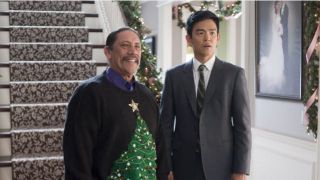
With big budget action movies and dramas, 3D can be used to add spectacle, but in comedy it serves a whole different purpose. While James Cameron may want to create a sense of depth, making the audience feel as though they can crawl through the scene and explore the world of Pandora in Avatar, funny movies can utilize the technology as an awesome gimmick, just throwing stuff out at the audience that will make them giggle. In the case of A Very Harold and Kumar 3D Christmas that means Claymation penises, pot smoke, ejaculate and confetti. You know, the basics.
This past weekend I had the chance to sit down one-on-one with director Todd Strauss-Schulson, who makes his debut on the third Harold and Kumar movie, and discuss the decision to use 3D, but also much, much more. Check out the interview below in which the filmmaker talks about the casting Danny Trejo as the ultimate nightmare father-in-law, what it’s like to have your first feature as a part of a franchise and the future of the Wafflebot.
I'm assuming that you've already got research and development teams working on the Wafflebot. So how many years away are we now?
It should be coming out next Christmas.
Next Christmas?
Absolutely. Yeah, it's military grade technology. But at a price of $39.99.
Awesome!
CINEMABLEND NEWSLETTER
Your Daily Blend of Entertainment News
All of the technology used really to make waffles, but also to eliminate bad guys-
Oh, of course.
Laser eyes...
I'm sure a loyalty function too.
Oh sure. We really wanted White Castle to start selling breakfast sandwiches that were like slider sized sandwiches with waffle buns and egg in the center.
Oh, that's brilliant. [laughs]
But it was too expensive [laughs]. Apparently.
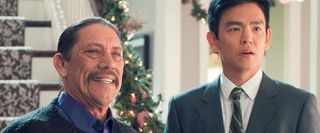
So this is your first feature film. Is it intimidating to come in in the middle of a franchise or was it kind of relaxing, considering that were two previous films for the characters to be developed?
I think it was a little of both. I mean, I'd never made anything that was longer than 7 minutes before I made this movie. I was used to shooting with an HVX in an apartment with my friends, honestly. So obviously this was a stressful, big, and ambitious, sort of scary opportunity. But it was also really exciting. Every day was a once in a lifetime- we blew up a car, there was fake snow, I shut down streets, there was a crash, there was a musical, all this stuff... I was very aware that every day I was like, really living my dream. The thing about it being a franchise, well two things- I was a fan of the movies, I saw the first one on DVD drinking beers with my friends. The second movie I saw at the Grove, stoned- can you say that? [laughs] Maybe. Eh, well I may or may not have been stoned [laughs].
So I really wanted to make this third one as a fan more than anything. And I really had just myself on a Friday night as the audience as my sort of barometer for what would be good. I got to make it move fast, it should be like you're strapped to a rocket while watching it, I wanted to deliver both action and comedy, and heart, y'know? I want it to be visual and weird, like that Sergei montage and that Perez flashback. Those are all new additions to a Harold and Kumar movie, things that I wanted to see as a viewer. Another challenge was really, you know, to make the third movie in a franchise- those are usually bad- to make it good, to make the fans love it, to give them more than they're expecting. Also as a filmmaker to make a debut feature- there is a bit of me in the movie, to make my big flamboyant splash. Like, “Here's my feature, here's my Reservoir Dogs, here's El Mariachi,” that happens to be the third of a franchise. That balance, like how do you respect the franchise and also show off a little bit.
Absolutely.
This movie also lends itself to show-off moments, like this is the kind of movie where you can do that, you go anywhere and do anything. Hopefully I've done stuff you haven't seen before, done in an original way.
Well actually one thing about this film is you really do have some big, ambitious stuff going on. You had a claymation sequence, the planning to break in at a church, that was kind of similar... I assume, was it based on the clowns versus cops short?
Yes, it was. Now that technique is in, like, every TV promo for a closer, like-
It's still ridiculously cool though.
It is cool, but then it was just that one commercial for Sony Bravia or whatever, and that was the reference. And the studio was like, “We like it, let's do it.” That sequence in particular, I love the idea of taking James Cameron's style of technology- and that is not easy, I mean, that is a hard process to do, very time consuming to get it all right. And to use that technology to tell the dirtiest joke in the world- I mean, that's a pedophile priest, that's nuns making out-
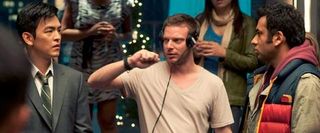
The showering…
Yeah! That's ejaculating on America- [laughs] But it's done with style, it's done with technological bravado. And so I like being able to use people's money and expertise to tell really dirty jokes.
I mean, going off that, you said 3D- for one, was it difficult, and what was the decision to make it in 3D? Was that always the plan?
The first draft of the script did not have 3D. It had a bunch, the Wafflebot already existed, but it did not have 3D. And when I went to start talking about making it, they said, “We're thinking about maybe doing this in 3D, what do you think?” And my first reaction was, “Ugh, 3D? Those movies are lame!” But then I was like, “Wait a second, 3D... that could be amazing! What a great gimmick, that's such a good idea!” World's first stoner 3D movie ever. And I was watching a lot of William Castle movies right around that time. He was the master of the gimmick. The vibrator under the seat, the smell-o-vision... And I was like, “This could be amazing, oh my god!” And it totally colored the movie for me in a different way, where all of a sudden I wasn't just directing a movie, I was like the ringleader, I was a showman. This was going to become a Christmas spectacular. Everything is gonna be in this movie- robots and babies and nudity and gore, heart and dance numbers and action and explosions, claymation. We threw the kitchen sink at it, so using the gimmick became really fun. And because all of us are just fans of these movies, like Clash of the Titans stole my money also- [laughs] we just made it very clear that we know it's a gimmick, we're gonna break the fourth wall with it, but we promise it's going to be cool. There's gonna be a lot of it, and it's going to funny. You're not going to be wasting your money to do this, we're not trying to screw you guys. You're gonna smoke up with Kumar in thirty seconds. And it's not gonna stop.
I've never understood why- I mean, the gimmick aspect of it, I've never understood why more comedies don't take it.
Yeah, I mean, Harold and Kumar is not the kind of movie that needs extra depth, like I don't need to see more of that crappy apartment. What I do want to see is a penis in my face. What I do want to see is an egg blowing up. I want to see things that I have not seen before. The other thing is, using 3D, at the end of the midnight mass sequence, that shot of Danny Trejo- I mean we talk about it a lot- people laugh really hard at that. I feel like they're laughing really hard at that almost because of the 3D. It's helping to puff up that joke. I-can't-believe-they-did-that moments are now so much bigger and better because you're actually interacting with the oh-no-they-didn't.
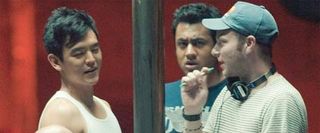
And just to talk about Danny Trejo- frankly, even when they first heard he was cast- I don't think there's an actor in the world that I'd be more terrified to have as a father, so I'm curious, what was the casting process like? Was he always-
That was always, well I thought that that would be great. It was in my first pitch. I Photoshopped a picture of Danny Trejo's face wearing a horrible Christmas sweater. I felt like that stunt casting, y'know, where you wouldn't expect it, would be really, really cool. Also, Trejo's got this face for 3D. He's got a face built to be shot in 3D.
Exactly! [laughs]
I mean, he's really got a lot of pockets of depth in his face. But I also know that he's a father. And he's funny! And he loved the idea of playing a dad. He loved the idea of wearing that sweater and holding that baby and kissing her cheeks, and he's got a daughter. He got that. And I was just such a crazy geek fan of his, like with all the Rodriguez movies, and I just wanted to meet him, y'know, selfishly. I also wanted to meet Robert Rodriguez. That hasn't happened yet, I need to make that happen. But I love the idea that he could get to the door, and without even saying a word, there's a laugh. Just because of all of the baggage he carries with him.
And just to talk more about the casting, I know that you have done work for College Humor.
Yeah.
So I'm curious about the casting of Amir Blumenfeld as Kumar's new friend.
I, you know, suggested casting Amir. I had worked with him in the past on a couple of shorts, I know all those College Humor guys. I think he's hilarious, I thought that he deserved to be in a movie. That character as written was like this really perverse, raunchy, fuckaholic character and I was afraid if we cast, whoever the new Jim Belushi is, then that would be very expected. So I liked the idea of, again, just playing as much against type as possible. It's the geeky guy who once he gets to the party is really not prepared for all the stuff he's been big-talking. And I just like the idea of bringing a buddy in there. I did that a couple of times. A lot of these guys I was making shorts with in my 20's and even a lot of the guys I went to college with are in the movie. Dan Levy, who was with the paparazzi with me in the hallway was a guy I shot a lot of stuff with, the heaven bartenders are guys that did punch up on the script and I shot every short I've ever made with those guys. Even the effects guys, the guys that did all these 3D effects are guys I knew when I was 13 years old.
Wow.
They did every college film and short out of college with me. And I saw the first Harold and Kumar with them, in a dorm room in Boston. And they ended up doing all these effects.
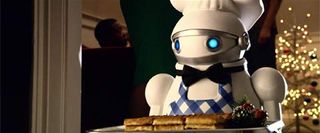
You went to Emerson, right?
Yeah, I went to Emerson.
I went to Boston University!
Oh, really? Steve Earl also went to Emerson.
There you go. Yeah, and I know tons of journalists that went to Emerson. We all just gravitate out here.
Yeah, it's like a trade school [laughs].
And you mentioned your relationship to the previous films, and obviously with the Neil Patrick Harris moments, people are always anticipating it because they're always so fantastic. So when developing for this movie, did you know that you just had to go all out with it?
Yeah, I mean Jon and Hayden really... I mean, the attempted rape, I mean, that was in the script. Even in the script it was the funniest thing, I love it so much. The musical was, y'know, the big thing I knew I could do new with Neil. The idea of a show-stopper that stops the movie just completely, and have him do that, and having the opportunity to do a 3D musical singing and dance number with Neil... and to shoot it like those old musicals, where there's no geography in the cameras, where it's choreographed and every shot is puzzled together- that was really exciting. Also, Neil having David there and sort of being able to play the modern version of himself. The second movie takes place a minute after the first, so now, y'know, Neil is out, he has children, he has David as his partner. And so it's so fun to play against type and he was really excited about that. It's amazing to me.
In your mind, have the past six years been the same career trajectory for Neil Patrick Harris? Like as in the movie?
Oh, yeah, yeah. He works in How I Met Your Mother, he makes money, he does a lot of philanthropy, he's got David in his life. For sure. He'll talk about it, he was on crack the whole time [laughs]. When we all talk about it, y'know, he put on this voice like Dean Martin or something. Like, [in a Dean Martin voice] “Hey, what's going on...” And that's like Neil's famous celebrity voice in the movie. It's not a celebrity voice in real life. But with the music, that was the idea, that he'd be like this showman, like a ring-a-ding-ding kind of guy. You know, when we had all that, like, 40's style music behind it? That was his idea.
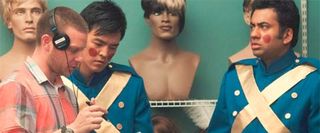
And actually, I thought that the music was great. Just the use of these classic Christmas carols. Especially the Perry Como. So how did you go about choosing the soundtrack? Did you kind of go against the tone of the film, is that the goal?
That was always the idea, the Trojan Horse movie idea was always the idea. That movie looked and felt, y'know, you could close your eyes and pretend like you're watching a classic Frank Capra movie. With a big holiday John Williams score and really elegant imagery and the trees look beautiful, it's warm and amber and all this stuff. But inside of it was this really subversive, godless, raunchy comedy, and that would be really interesting. And you would walk of the movie out feeling really warm and fuzzy and nice, but really you just got spoon-fed a bunch of perversions.
Right.
I always thought that would be really cool, and I thought the fastest way to sort of evoke that nostalgia was music. With these great Christmas carols, Johnny Mathis and stuff. Our score, like the London Symphony Orchestra did it and it's all this brass and all these melodies that hopefully people will remember. The idea was to play against type, absolutely. To make all this dirty stuff sweet and all this stupid stuff smart.
Sure. Now it seems I have to wrap up, so my last question is, just personally: waffles or pancakes?
Waffles. Fuck pancakes [laughs].

Eric Eisenberg is the Assistant Managing Editor at CinemaBlend. After graduating Boston University and earning a bachelor’s degree in journalism, he took a part-time job as a staff writer for CinemaBlend, and after six months was offered the opportunity to move to Los Angeles and take on a newly created West Coast Editor position. Over a decade later, he's continuing to advance his interests and expertise. In addition to conducting filmmaker interviews and contributing to the news and feature content of the site, Eric also oversees the Movie Reviews section, writes the the weekend box office report (published Sundays), and is the site's resident Stephen King expert. He has two King-related columns.
Most Popular




